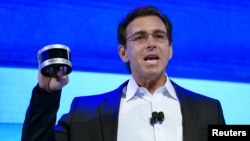Ford Motor Co. said Tuesday that it plans to triple to 30 the size of its fleet of self-driving test cars as part of an effort to accelerate autonomous vehicle development.
In an announcement coinciding with the Consumer Electronics Show in Las Vegas, Ford said it will begin using a new, lower-cost LiDAR sensor made by California-based Velodyne. The high cost of such sensors, which act as the eyes of a self-driving car, is one of the main technical obstacles to widespread commercialization of self-driving vehicles, industry executives say.
Ford said it will be the first automaker to use Velodyne's new solid-state "hybrid Ultra PUCK Auto" sensor. The compact device replaces the spinning scanners mounted on the rooftops of some autonomous test vehicles. Ford said two of these sensors could replace four current LiDAR sensors. The Ultra PUCKs are small enough to mount on a side-view mirror, Ford said.
Ford said it will add 20 hybrid Ford Fusion sedans to its existing 10-vehicle self-driving car fleet, and test them on roads in California, Arizona and Michigan. Rival automakers are also testing fleets of self-driving cars on and off public roads. Alphabet Inc.'s Google has been testing self-driving cars of various kinds, including some of its own design, since 2009.
Home, drone technology
Separately, Ford said it is exploring ways to link in-home automation devices such as Amazon.com Inc.'s Echo to the Sync communications systems in its cars to allow consumers to control lights or thermostats inside the home from the car, or start up cars and check fuel levels from inside the house.
In a third technology-related move, Ford said it will collaborate with drone maker DJI to sponsor a contest to develop drone-to-vehicle communications systems using the connectivity systems on a Ford F-150. Contestants would design a system that U.N. workers can use to survey disaster areas, Ford said. The winner would get $100,000.
Ford also said Apple Inc.'s CarPlay and Google's Android Auto smartphone connectivity platforms would come preinstalled in all 2017 model year cars equipped with Sync 3, its latest infotainment system.
Ford said 2016 model year car owners with Sync 3 will be able to upgrade to Apple CarPlay and Android Auto.





